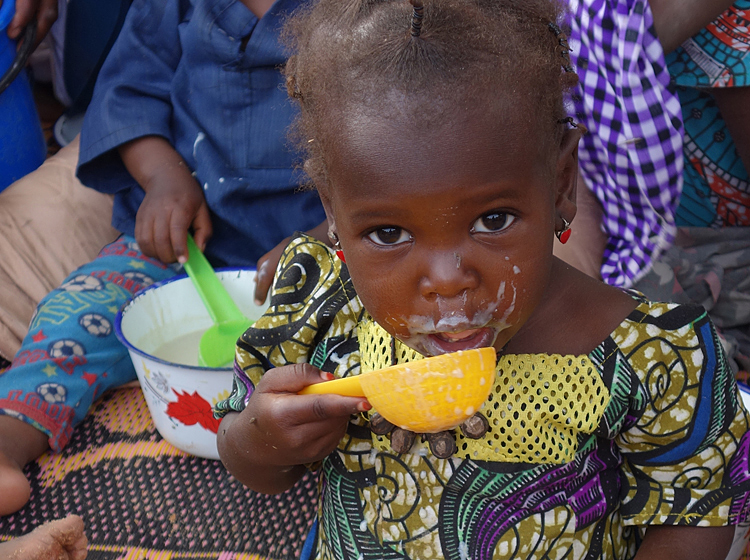In 2017, the second year of cooperation between CARE Luxembourg and Doneck Euroflex, "nutrition schools" were set up in 79 project villages in which malnourished children were cared for and pepped up.
A diagnostic study was conducted at the start of the project, in the course of which CARE determined the state of health of children aged 6 to 23 months in 59 villages. Malnutrition is determined on the basis of the circumference of the upper arm. A child is suffering from moderate malnutrition with a circumference of 115 to 125 mm and acute malnutrition with a circumference of less than 115 mm. The results of the examination of 3,138 children showed 2,755 healthy children, 318 moderately malnourished and 65 acutely malnourished children. The acutely malnourished children were treated immediately in a health centre or hospital.
"Nutrition schools" were set up in 16 villages in the village centre under the baobab tree for 156 children with moderate malnutrition. Here the mothers learned every day how to prepare nutritious, high-calorie meals for their children with few ingredients and the right dosage. While the dishes were cooking, seminars were held on the subjects of hygiene and foodstuffs. In order to judge progress after the two-week "nutrition school", the children's upper arms were measured again.
A total of 139 children had already managed to reach a "normal" nutritional state after two weeks. "A fantastic result, especially considering the collection of the data took place in a month in which the foodstuffs were rather scarce", says Robert Schadeck, president of CARE Luxembourg, commenting on this success.
In order to see whether the knowledge gained was also being used at home, house visits were made to the families concerned following the "nutrition schools" by CARE. During a visit to a hospital, medical personal gave their assurance that children whose mothers had visited the "nutrition school" by CARE had not returned to the hospital due to malnutrition.
Thanks to the generous donation by Doneck it was possible to cover not only the costs of the procurement and distribution of the materials such as ladle sets, tape measures, children's scales, books and pens for the nutrition schools, but also in part the personnel and logistic costs for this project. Most important: a great contribution has been made to the avoidance of malnutrition in infants in these villages in future.
Editors: Care Luxemburg and Doneck Euroflex
Photo: Wies / Care Luxemburg


